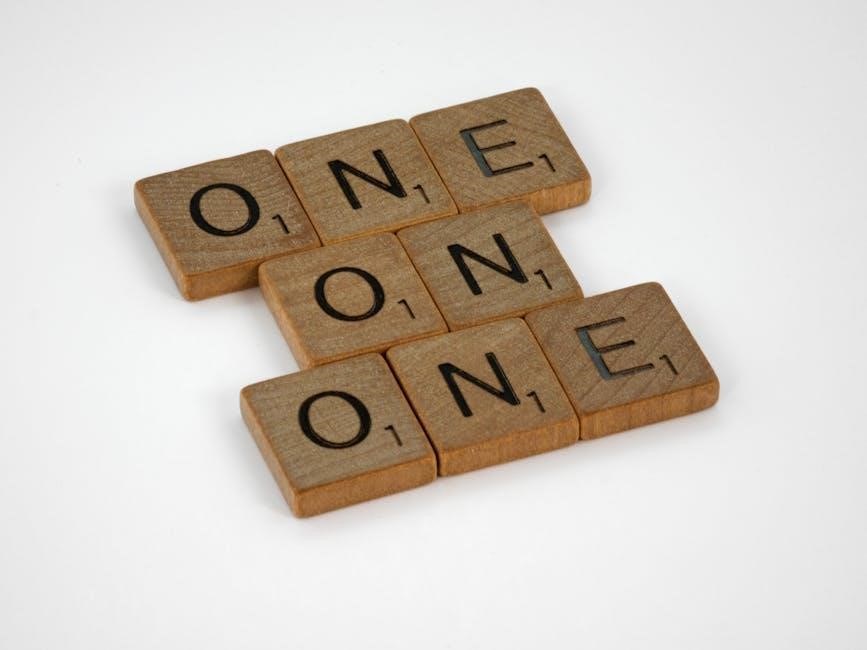Discover the meaning behind “one who instructs” crossword clue, a common puzzle query. Explore its educational relevance and strategies for solving such clues using online tools.
Understanding the Crossword Clue
The crossword clue “one who instructs” refers to individuals who teach, guide, or mentor others. This clue is often straightforward, seeking synonyms for educators or trainers. Solvers can approach it by identifying common roles associated with teaching or coaching, such as teachers, professors, or mentors. The clue’s simplicity makes it accessible, but its broad scope allows for multiple correct answers. Crossword enthusiasts often use online tools or dictionaries to verify possible solutions, ensuring accuracy. Understanding the context of the puzzle can also help narrow down the correct answer, making this clue both educational and engaging for solvers of all levels.
Importance of Crossword Puzzles in Cognitive Development
Crossword puzzles are renowned for their cognitive benefits, enhancing memory, vocabulary, and problem-solving skills. They stimulate the brain by requiring word recall and pattern recognition, making them a valuable tool for mental sharpness. Solving clues like “one who instructs” challenges the mind to think creatively and logically, fostering critical thinking. Regular engagement with crosswords can improve concentration and delay cognitive decline. For learners, crosswords are an engaging way to expand knowledge and reinforce language skills. Their structured yet fun nature makes them an excellent activity for mental growth across all age groups, blending entertainment with intellectual development.
Overview of Crossword Solving Strategies
Solving crossword clues like “one who instructs” requires a mix of vocabulary knowledge, logical thinking, and strategic approaches. Start by analyzing the clue for hints or word patterns, and consider possible synonyms or related terms. Utilize online crossword solvers or dictionaries to explore potential answers. Pattern matching tools can help identify letter sequences, while clue search engines provide solutions based on the wording. Breaking down the puzzle into smaller sections and filling in known answers first can also simplify the process. Combining these strategies ensures efficient and enjoyable problem-solving, making crosswords a rewarding mental exercise.

Possible Answers to “One Who Instructs”
Common solutions include “teacher,” “trainer,” or “mentor,” each fitting various contexts. “Professor” and “coach” are also options, depending on the crossword’s specificity.
Teacher
A “teacher” is a common answer to the crossword clue “one who instructs,” referring to someone who educates or guides others. This versatile term applies to various educational settings, from schools to workshops. Teachers play a crucial role in cognitive development, fostering knowledge and critical thinking. In crosswords, “teacher” often fits as a 7-letter answer, making it a popular solution for puzzlers. Other related terms like “educator” or “professor” may also appear, depending on the clue’s context. The simplicity and universality of “teacher” make it a frequent choice in crossword puzzles, aligning with the theme of instruction and learning.
Trainer
A “trainer” is another possible answer to the crossword clue “one who instructs,” often referring to someone who teaches or guides in a specific field, such as sports, fitness, or professional development. Unlike “teacher,” “trainer” implies hands-on instruction or skill-building in a practical context. In crossword puzzles, “trainer” is a common 7-letter solution, making it a flexible fit for various clues. The term is widely recognized and aligns with themes of mentorship and expertise. Crossword solvers often list “trainer” as a top candidate when the clue hints at instruction in specialized areas, such as coaching or vocational training.
Mentor
A “mentor” is a common answer to the crossword clue “one who instructs,” referring to someone who provides guidance, wisdom, and support to others. Often associated with professional or personal development, a mentor shares knowledge and experience to help others grow. In crossword puzzles, “mentor” is a popular 6-letter solution, fitting various clue patterns. The term emphasizes a nurturing role, distinct from formal teaching. Crossword solvers frequently list “mentor” as a potential answer when the clue suggests a guiding or advisory relationship. Its versatility makes it a sought-after solution for both casual and competitive puzzle enthusiasts, aligning with themes of leadership and expertise.
Professor
A “professor” is another common solution to the crossword clue “one who instructs,” particularly in academic contexts. This 9-letter word fits well in puzzles, especially those with educational themes. Crossword solvers often encounter “professor” as a key answer, given its relevance to teaching and expertise. The term is widely recognized, making it a popular choice for constructors. Online tools and crossword dictionaries frequently list “professor” as a potential solution, aiding solvers in completing challenging grids. Its association with higher education adds depth to its usage in puzzles, making it a versatile and meaningful answer for many crossword clues.
Coach
“Coach” is a popular 5-letter answer to the crossword clue “one who instructs,” often appearing in puzzles related to sports or personal development. This versatile term fits well into various crossword themes, making it a common solution for solvers. Coaches provide guidance, training, and mentorship, aligning perfectly with the clue’s intent. Crossword solvers frequently encounter “coach” as a key answer due to its broad applicability. Online tools and crossword dictionaries highlight “coach” as a potential solution, aiding players in completing challenging grids. Its relevance across multiple contexts ensures its popularity in crossword puzzles, making it a reliable choice for constructors and solvers alike.

Exploring Crossword Solving Tools
Online crossword solvers, dictionaries, and pattern-matching search engines are indispensable for solving clues like “one who instructs.” These tools provide quick access to answers and word patterns, aiding solvers effectively.
Online Crossword Solvers
Online crossword solvers are essential tools for tackling clues like “one who instructs.” They allow users to input partial answers or patterns, providing instant solutions; These platforms often combine clue search engines with pattern-matching algorithms, ensuring accurate results. Many solvers, like crossword dictionaries, offer access to millions of entries, covering both clues and word definitions. They are particularly useful for tricky clues, as they eliminate guesswork and save time. Whether you’re a casual solver or a competitive puzzler, online crossword solvers enhance your problem-solving experience, making crossword puzzles more enjoyable and accessible for everyone.
Crossword Dictionaries
Crossword dictionaries are invaluable resources for solving clues like “one who instructs.” These comprehensive tools contain millions of entries, including words, phrases, and clues from various crossword puzzles. They allow users to search for answers based on clues or partial word patterns, making them indispensable for puzzlers. Many crossword dictionaries are available online, offering quick access to solutions. They cover a wide range of crossword publications, ensuring relevance and accuracy. Whether you’re stuck on a specific clue or seeking inspiration, crossword dictionaries provide a reliable way to expand your vocabulary and improve your problem-solving skills, enhancing your overall crossword experience.
Pattern Matching Search Engines
Pattern matching search engines are powerful tools for solving crossword clues like “one who instructs.” These engines allow users to input partial answers or word patterns, using wildcards for unknown letters. By analyzing vast databases, they generate possible matches, helping solvers fill in gaps. This feature is especially useful when only a few letters are known. Many crossword platforms integrate pattern matching to assist with tricky clues. These tools not only aid in completing puzzles but also enhance learning by revealing new words and meanings. They are essential for crossword enthusiasts seeking efficiency and accuracy in their problem-solving process.
Clue Search Engines
Clue search engines are invaluable for solving crossword puzzles by allowing users to input the exact wording of a clue, such as “one who instructs.” These tools scour extensive databases to find matching answers, providing a list of possible solutions. They are particularly useful when the clue is vague or open-ended. Many crossword platforms offer this feature, enabling solvers to quickly identify the correct word. Clue search engines enhance efficiency and accuracy, making them indispensable for both casual and competitive puzzlers. They also support partial clue searches, helping users even when they can’t recall the exact phrasing.

Strategies for Solving Crossword Puzzles
Effective strategies include breaking down clues, identifying word patterns, and using elimination techniques. Start with shorter clues and leverage online tools for assistance. Practice improves skill.
Breaking Down the Clue
Breaking down the clue “one who instructs” involves analyzing its components to identify possible answers. Start by understanding the key terms: “one who” indicates a person, and “instructs” suggests teaching or guiding. Consider synonyms like “teacher” or “mentor.” Use online crossword solvers or dictionaries to explore word patterns and meanings. Look for common prefixes or suffixes that align with the clue. Begin with shorter clues to fill in known letters, then cross-reference with intersecting words in the grid. This methodical approach helps narrow down potential answers efficiently, enhancing your problem-solving skills and enjoyment of crossword puzzles.
Using Word Patterns
Using word patterns is a powerful strategy for solving crossword clues like “one who instructs.” Identify common letter combinations or endings that align with the clue. For example, words ending in “-er” or “-or” often indicate professions or roles. Look for patterns like “teach-” or “ment-” which relate to instructing. Tools like crossword dictionaries or pattern-matching search engines can help find words that fit these patterns. By focusing on letter sequences and their meanings, you can narrow down potential answers efficiently. This approach enhances your ability to decode clues and fill in the grid accurately, making crossword solving more enjoyable and systematic.
Leveraging Crossword Themes
Leveraging crossword themes can significantly aid in solving clues like “one who instructs.” Many crosswords revolve around specific themes, such as education, professions, or general knowledge. Identifying the puzzle’s theme helps narrow down potential answers. For example, if the theme is education, “teacher” or “professor” might fit. Themes often provide contextual clues, making patterns and wordplay more apparent. By understanding the theme, solvers can better align their guesses with the puzzle’s intent. This strategy not only enhances solving efficiency but also deepens engagement with the crossword’s design. Themes add layers of meaning, making crosswords both challenging and rewarding to complete.
Elimination Techniques
Elimination techniques are a powerful strategy for solving crossword clues like “one who instructs.” Start by identifying letters you already know in the puzzle and use them to eliminate impossible answers. For example, if the clue requires a 7-letter word and you know the first letter is “T,” you can narrow down options like “teacher” or “trainer.” Elimination also involves considering word meanings. If a potential answer doesn’t fit the clue’s context, discard it. This method reduces guesswork and increases efficiency. By systematically removing unlikely options, you can pinpoint the correct answer more effectively, especially in challenging puzzles.

Popular Crossword Puzzle Types
Explore various crossword types like NYT, Daily Celebrity, Telegraph, and LA Times puzzles, each offering unique challenges and engaging themes for solvers worldwide.
NYT (New York Times) Crosswords
The New York Times (NYT) crossword is a benchmark for puzzle enthusiasts, offering daily challenges that test vocabulary and logical thinking. Known for their clever themes and varying difficulty levels, NYT crosswords are widely popular among solvers. They often feature clues like “one who instructs,” which might lead to answers such as “teacher” or “mentor.” The puzzles are designed to sharpen cognitive skills and provide entertainment. With a legacy of over a century, NYT crosswords remain a staple in the world of puzzle-solving, attracting both casual players and competitive solvers alike. Their enduring popularity underscores their educational and recreational value.
Daily Celebrity Crosswords
Daily Celebrity Crosswords are a popular choice for puzzle enthusiasts, offering engaging and culturally relevant clues. The “one who instructs” clue often appears in these puzzles, with answers like “teacher” or “coach.” These crosswords are known for their accessibility and fun themes, appealing to both casual solvers and crossword aficionados. They frequently incorporate pop culture references, making them a great way to stay connected with current trends while sharpening cognitive skills. With tools like crossword solvers and dictionaries, players can easily navigate challenging clues. Daily Celebrity Crosswords provide a enjoyable and educational experience, combining entertainment with mental stimulation for players of all skill levels.
Telegraph Crosswords
Telegraph Crosswords are renowned for their challenging grids and clever clues, offering a stimulating experience for avid solvers. The “one who instructs” clue often appears, with answers like “teacher” or “trainer.” These crosswords are popular for their balanced mix of general knowledge and wordplay, making them a favorite among both casual and experienced puzzlers. The Telegraph’s puzzles frequently feature British cultural references, adding a unique flavor. Solving them requires a blend of vocabulary, logic, and lateral thinking. With their well-structured clues and engaging themes, Telegraph Crosswords provide a rewarding challenge for those looking to sharpen their crossword-solving skills and expand their knowledge base.
LA Times Crosswords
LA Times Crosswords are a popular choice among puzzle enthusiasts, offering daily challenges with a mix of straightforward and clever clues. The “one who instructs” clue often appears, with common answers like “teacher” or “trainer.” These crosswords are known for their clear clues and balanced difficulty, making them accessible to both beginners and experienced solvers. The puzzles cover a wide range of topics, from general knowledge to pop culture, ensuring there’s something for everyone. Their user-friendly format and consistent quality have made LA Times Crosswords a staple in many daily routines, providing hours of engaging and intellectually stimulating fun.

Advanced Crossword Solving Techniques
Master advanced techniques like cryptic clues, anagrams, and pattern matching to solve complex crosswords. Utilize tools like crossword dictionaries and solvers for tackling tricky clues effectively.
Cryptic Crosswords
Cryptic crosswords are a challenging form of puzzles requiring lateral thinking and wordplay. Clues often involve double definitions, anagrams, or charades. For “one who instructs,” solvers might encounter clues like “Guide with a lesson plan (5),” leading to answers like “TEACH.” These puzzles demand a deep understanding of language nuances and creative problem-solving. Advanced solvers use techniques like identifying hidden patterns or breaking down clues into components. Tools like crossword solvers and dictionaries can aid in deciphering complex clues, making these puzzles more accessible. Mastering cryptic crosswords enhances cognitive skills and offers a rewarding mental challenge for enthusiasts.
Anagrams and Wordplay
Anagrams and wordplay are key elements in crossword puzzles, adding complexity and fun. For “one who instructs,” clues might involve rearranging letters or interpreting phrases creatively. For example, “teacher” could emerge from an anagram like “cheater.” Wordplay often involves puns or double meanings, such as “coach” or “mentor,” which fit the theme. Solvers must think creatively to decode these clues. Tools like crossword solvers and anagram generators can help unravel tricky patterns. Mastering anagrams and wordplay enhances problem-solving skills and makes crossword puzzles more engaging. These techniques keep solvers on their toes, ensuring a challenging yet rewarding experience.
Handling Multiple Meanings
Crossword clues often have multiple meanings, requiring solvers to interpret them creatively. For “one who instructs,” possible answers like “teacher,” “trainer,” or “coach” fit, but the correct choice depends on context. Clues may be ambiguous, and solvers must consider all definitions. For example, “mentor” could also fit, adding another layer of complexity. Online tools like crossword solvers can help identify the intended answer by analyzing the puzzle’s grid and intersecting words. Handling multiple meanings enhances critical thinking and problem-solving skills, making crosswords a stimulating mental exercise. Mastering this skill ensures solvers can tackle even the most challenging clues effectively.
Using Crossword Grid Patterns
Understanding crossword grid patterns is crucial for solving clues like “one who instructs.” The grid’s structure often reveals word lengths and intersections, helping narrow down possible answers. By examining the number of letters and adjacent words, solvers can identify the most fitting term. For example, if the answer intersects with a word ending in “ER,” “teacher” becomes a strong candidate. Online tools and pattern-matching search engines can analyze these grids to suggest answers. This method ensures solvers efficiently navigate the puzzle, making it easier to find the correct answer among multiple possible meanings.

Psychology Behind Crossword Solving
Crossword solving enhances cognitive skills like memory and problem-solving. The satisfaction of finding answers boosts motivation, fostering persistence. It also highlights how beliefs about abilities influence performance.
Cognitive Benefits of Crossword Puzzles
Crossword puzzles significantly enhance cognitive abilities, improving memory, problem-solving, and mental sharpness. They strengthen neural connections, boosting brain function and delaying cognitive decline. Regular solving fosters critical thinking and linguistic skills, enhancing vocabulary and comprehension. The process of deciphering clues and patterns stimulates the mind, promoting mental agility. Additionally, crosswords encourage persistence and satisfaction upon solving, reinforcing a growth mindset. These cognitive benefits make crosswords a valuable tool for lifelong learning and mental well-being, particularly for those seeking to challenge themselves intellectually.
Motivation and Persistence in Solving Puzzles
Motivation and persistence are key drivers in solving crossword puzzles. Overcoming challenges boosts confidence and fosters a sense of accomplishment. Solvers often stay motivated by the thrill of uncovering hidden meanings and patterns. Persistence is fueled by curiosity and the satisfaction of filling in the final answer. Online tools and resources, like crossword dictionaries and solvers, provide support when progress stalls. The incremental nature of crosswords—completing one clue at a time—reinforces persistence. Additionally, the joy of learning new words and concepts keeps enthusiasts engaged, making crossword puzzles a rewarding and intellectually stimulating activity that encourages determination and mental resilience.
The Role of Memory in Crossword Solving
Memory plays a crucial role in crossword solving, as it relies on recalling words, definitions, and patterns. Experienced solvers often develop a mental database of common clues and answers, aiding quick solutions. Memory enhances with practice, as repeated exposure to words and themes strengthens retention. Strategies like associating clues with personal experiences or using repetition can improve recall. However, memory limitations can sometimes hinder progress, making crossword dictionaries and online tools indispensable. The interplay between memory and problem-solving skills highlights the cognitive benefits of crosswords, as they challenge and sharpen both recall and critical thinking abilities.

Crossword Culture and Community
Crossword culture fosters a vibrant community of solvers who share enthusiasm, solutions, and strategies. Clubs, competitions, and online forums create bonds among participants, enhancing the joy of solving.
Competitive Crossword Solving
Competitive crossword solving has grown into a dynamic and engaging community. Events like the American Crossword Puzzle Tournament (ACPT) attract solvers worldwide, testing speed and accuracy. Online platforms host live competitions, fostering a sense of camaraderie among participants. Solvers often share strategies and insights, turning competitions into learning opportunities. The competitive scene highlights the intellectual challenge and enjoyment of crosswords, proving that puzzle-solving can be both a hobby and a sport. These events celebrate the passion for wordplay and linguistic mastery, uniting enthusiasts in their pursuit of crossword excellence.
Crossword Puzzle Clubs
Crossword puzzle clubs offer a welcoming space for enthusiasts to share their passion for wordplay. These clubs often host regular meetings, where members solve puzzles together, discuss strategies, and learn from experienced solvers. Many clubs organize events, such as themed puzzle days or competitions, to keep the community engaged. They also provide resources like puzzle archives, solving tips, and access to expert instructors. Crossword clubs foster camaraderie among members, creating a supportive environment where participants can improve their skills and celebrate their love for crosswords; Whether you’re a novice or an expert, joining a crossword club can enhance your puzzle-solving journey.
Online Crossword Communities
Online crossword communities provide a dynamic platform for enthusiasts to connect, share insights, and solve puzzles collaboratively. These forums and social media groups allow members to discuss clues, share strategies, and learn from one another. Many platforms host live solving sessions, where participants can work through crosswords in real-time. Additionally, online communities often feature resource libraries, including guides and tutorials, to help improve solving skills. They also serve as spaces for competitive solving, with leaderboards and challenges. For anyone passionate about crosswords, online communities offer endless opportunities to engage with like-minded individuals and enhance their puzzle-solving expertise from the comfort of home.
Exploring the “one who instructs” crossword clue offers insights into educational themes and solving strategies, fostering cognitive growth and enjoyment through engaging puzzle experiences and online resources.
The Joy of Crossword Puzzles
Crossword puzzles bring immense joy by challenging the mind and sparking curiosity. Solving clues like “one who instructs” offers a sense of achievement and mental stimulation. The process of deciphering hints and filling in answers creates a rewarding experience, fostering problem-solving skills and expanding vocabulary. Crosswords also serve as a relaxing yet engaging activity, allowing individuals to unwind while exercising their cognitive abilities. The thrill of uncovering hidden meanings and patterns adds to the fun, making crossword puzzles a timeless source of entertainment and intellectual growth for people of all ages and skill levels.
Continuous Learning Through Crosswords
Crossword puzzles promote continuous learning by challenging individuals to expand their vocabulary and think critically. Each clue, like “one who instructs,” encourages problem-solving and knowledge retention. Solving crosswords regularly enhances memory and sharpens cognitive skills, fostering a lifelong commitment to intellectual growth. The process of searching for answers and understanding wordplay teaches patience and persistence. Over time, crossword enthusiasts develop a broader understanding of various subjects, from history to science, making crosswords a dynamic and engaging tool for ongoing education and personal development.
The Future of Crossword Solving
The future of crossword solving is poised to evolve with advancements in technology and AI. Online crossword solvers and clue search engines will likely become more sophisticated, offering real-time solutions and personalized hints. Machine learning models may predict puzzle patterns, aiding solvers in tackling complex clues like “one who instructs.” Additionally, interactive platforms could enhance collaborative solving, fostering a stronger crossword community. As crosswords adapt to digital formats, they will remain a vibrant tool for cognitive engagement and learning, ensuring their enduring appeal in a rapidly changing world.






